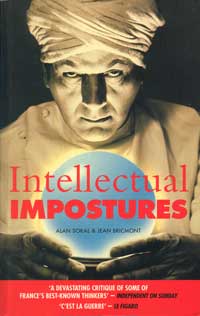
Postmodern Philosophers' Abuse of Science
Alan Sokal and Jean Bricmont
London, 1998.
Sokal (an American) and Bricmont (a Belgian), two scientists, discuss the writings of the following prominent theorists, insofar as they concern ideas in physics and mathematics, areas of professional competence for the former, but not, seemingly, for these persons: Jacques Lacan, Julia Kristeva, Luce Irigaray, Bruno Latour, Jean Baudrillard, Gilles Deleuze, Felix Guattari, and Paul Virilio.
The authors make it clear at the outset that they are not analyzing postmodern thought in general, but this has not prevented outraged reactions from supporters of the theorists mentioned. Despite the exemplary clarity and carefulness of the book, it has been subjected to exactly the kind of arbitrary, uninformed, fallacious and frankly puerile remarks that are the object of the study in the first place. One of the protagonists, Latour, demonstrated this in person when the book came out in Britain, by debating with Sokal at the London School of Economics in a shamefully clownish way, avoiding questions, changing the subject, and generally failing to give a reasoned account of himself.
Some of Latour's statements are truly ridiculous, as when he opines that it would be anachronistic to suggest that a mummified Egyptian could have died of tuberculosis, if the relevant bacillus was not discovered (by Robert Koch) until 1882.
"He goes so far as to assert that 'Before Koch, the bacillus has no real existence.' He dismisses the common-sense notion that Koch discovered a pre-existing bacillus as 'having only the appearance of common-sense'." (footnote 123, p.88)
The chapter on Virilio is astonishing. The "philosopher of speed" is guilty of the most dismal blunders, such as confusing velocity with acceleration, or saying that electrons move at the speed of light. Worse even than this is the grotesque pretentiousness of his style. Virilio has a lot to say, but without really saying anything. He represents a type of Continental Philosophy I have come to think of as Incontinent(al) Philosophy, hallucinating on his own metaphors.
The question of metaphor is complex, not to say vexed, but I think it is possible to say some clear things about it, and I think Sokal and Bricmont have done this:
"Some people will no doubt think that we are interpreting these authors too literally and that the passages we quote should be read as metaphors rather than as precise logical arguments. Indeed, in certain cases the 'science' is undoubtedly intended metaphorically; but what is the purpose of these metaphors? After all, a metaphor is usually employed to clarify an unfamiliar concept by relating it to a more familiar one, not the reverse." (p.9)
It seems to be fundamentally important not to take metaphor literally. (This mistake seems to be what's going on in the case of New Agers babbling on about "energy".) It may in many cases be hard to work out whether a writer like Baudrillard is being metaphorical or not, but Sokal quotes passages where literal statements are being attempted, albeit in a baffingly abstruse way. When Baudrillard is being literal, he seems to be just wrong. When he is being metaphorical, he is being wilfully obscure for no conceivable reason other than to bamboozle the reader. This might be called "play", but aren't his supporters admiring his insights into the workings of the world, rather than merely watching him play in some academic sand-pit?
The epilogue to the book includes the section, "Science is not a 'text'":
"The natural sciences are not a mere reservoir of metaphors ready to be used in the human sciences [or the arts?]. Non-scientists may be tempted to isolate from a scientific theory some general 'themes' that can be summarized in few words such as 'uncertainty', 'discontinuity', 'chaos' or 'nonlinearity' and then analyzed in a purely verbal manner. But scientific theories are not like novels; in a scientific context these words have specific meanings, which differ in subtle but crucial ways from their everyday meanings, and which can only be understood within a complex web of theory and experiment. If one uses them as metaphors, one is easily led to nonsensical conclusions." (p.177)
One of the reflex insults against science is the charge of reductionism. I reckon that many postmodernists are reductionists of a different kidney: they reduce the richness of nature and culture to a heap of texts or words. If it is the case that Virilio, Baudrillard, Lacan and the others are bluffing like crazy, and if current conditions are such that even the attempt to suggest this is met with unworthy and puerile reaction in French journals and other places, in lieu of serious argument, then things are worse than they ought to be, and a great many people have been victims of a kind of systematic mystification for far too long.
Sokal Articles on the Social Text Affair: www.physics.nyu.edu/faculty/sokal
© Paul Taylor 2001